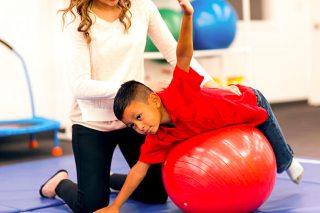Physical therapy (PT) offers significant benefits for children, particularly those facing developmental delays, physical impairments, or conditions that impact their mobility and functionality. The primary objective of pediatric physical therapy is to enable children to attain greater independence in movement, enhance their physical abilities, and improve their overall quality of life
Doctors often recommend physical therapy for children who have been injured or have movement problems from an illness, disease, or disability.
After an injury, physical therapists are often able to relieve pain and help children resume daily activities. Physical therapists teach children exercises designed to help them regain strength and range of motion, and also show them how to prevent a recurring injury.
Physical therapy (PT) may be needed any time a child has difficulty moving in such a way that it limits daily activities.
Doctors may recommend PT for children with:
- Sports injuries – Physical therapy aids in recovery by reducing pain, improving mobility, strengthening muscles, and preventing future injuries through proper training techniques.
- Developmental delays – Physical therapy assists children experiencing delays in motor skills, while occupational therapy focuses on enhancing fine motor skills. Early intervention is crucial for optimizing long-term developmental outcomes.
- Cerebral palsy – Physical therapy enhances muscle tone, flexibility, and balance. Occupational therapy supports individuals in performing daily activities, while speech therapy focuses on improving communication skills.
- Genetic disorders – Various therapies, including physical therapy and speech therapy, target motor delays, cognitive challenges, and communication difficulties to enhance overall quality of life.
- Orthopedic disabilities/injuries – Physical therapy is instrumental in facilitating post-injury recovery, enhancing mobility, and preventing stiffness. In more severe cases, surgical intervention might be necessary, and physical therapy is essential for effective rehabilitation.
- Heart and lung conditions – Cardiopulmonary physical therapy enhances cardiac and pulmonary functionality, boosts endurance, and provides education to children and their families on effective symptom management.
- Birth defects (such as spina bifida) – Physical therapy supports children’s mobility development, the use of assistive devices, and muscle strengthening to enhance their independence. In contrast, occupational therapy emphasizes the acquisition of self-care skills.
- Effects of in-utero drug or alcohol exposure – Prenatal exposure to substances such as alcohol or drugs may result in developmental and physical challenges, including fetal alcohol spectrum disorder (FASD).
- Acute trauma – Physical injuries can occur due to accidents or unforeseen events, such as vehicle collisions or slips and falls. Physical therapy is aimed at restoring strength and functionality, while psychological therapy may help address any emotional trauma. Physical therapy facilitates improved mobility, alleviation of pain, and overall recovery.
- Head injury – Traumatic brain injuries (TBI) result from external forces and may lead to various cognitive, physical, and emotional challenges. Physical therapy plays a crucial role in restoring mobility and balance, speech therapy focuses on improving communication skills, and cognitive rehabilitation assists individuals in regaining memory and cognitive abilities.
- Limb deficiencies – Physical and occupational therapy assist children in adapting to the use of prosthetics and in modifying daily activities. These therapies emphasize the development of strength and enhancement of coordination skills.
- Muscle diseases – Conditions like muscular dystrophy can lead to progressive muscle weakness. Engaging in physical therapy may help slow muscle deterioration, preserve mobility, and enhance respiratory function. Additionally, physical therapy supports children in adapting to their evolving physical capabilities.


